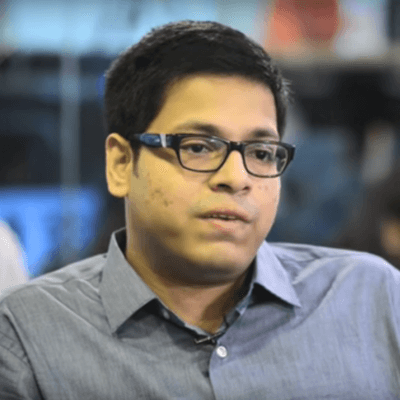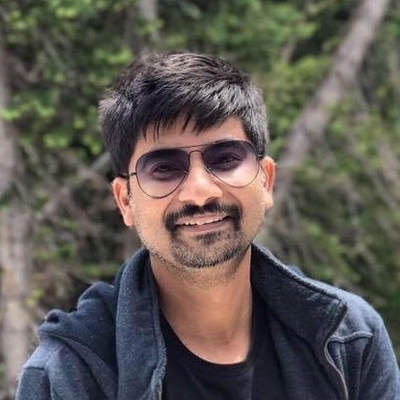Schedule - PDF | Interactive Program Committee

Executive Vice President, Info Edge India
Abstract: In this talk, we will demonstrate that deep learning has a very strong connection to the psychology of human decision making. Several behavioural economists and psychologists have researched on the hidden parameters through which we learn and make decisions, especially under uncertainty. We will talk about few such important life decisions that go beyond choosing a movie or doing eCommence. These decisions are around choosing a job, a life partner and a house. At Info Edge, we use deep learning in different businesses of the company, where the businesses are a job-portal (India's largest), matrimony (aka dating) site and a real estate site.
Bio: Nitendra Rajput works as Executive Vice President and Head of Data Science at Info Edge where he defines and leads the data science work for various Info Edge businesses such as naukri, jeevansathi, 99acres. Prior to this, Nitendra was at IBM Research for 18 years, managing the mobile agenda for IBM Research in India. Nitendra has authored over 80 publications at top international ACM and IEEE venues, owing to which he has been recognized as an ACM Distinguished Scientist and a senior IEEE Member. He has delivered several tutorials and conducted workshops in AI and speech areas at top ACM venues (MobileHCI, IUI, CSCW, CHI). With over 50 patents to his name, Nitendra was an IBM Master Inventor and was also an IBM Academy of Technology member. In 2012, he coauthored a book titled "Speech in Mobile and Pervasive Environments" that was published by John Wiley & Sons.

Senior Machine Learning Scientist, Amazon
Abstract: E-commerce websites such as Amazon, Alibaba, and Walmart typically process billions of orders every year. Semantic representation and understanding of these orders is extremely critical for an eCommerce company. Each order can be represented as a tuple of . Exploring the space of all plausible orders could help us better understand the relationships between the various entities in an e-commerce ecosystem, namely the customers and the products they purchase. In this paper, we propose a Generative Adversarial Network (GAN) for orders made in e-commerce websites. Once trained, the generator in the GAN could generate any number of plausible orders. Our contributions include: (a) creating a dense and low-dimensional representation of e-commerce orders, (b) train an ecommerceGAN (ecGAN) with real orders to show the feasibility of the proposed paradigm, and (c) train an ecommerce-conditional-GAN (ec^2GAN) to generate the plausible orders involving a particular product. We propose several qualitative methods to evaluate ecGAN and demonstrate its effectiveness.
Bio: Arijit Biswas is currently a Senior Machine Learning Scientist at the India machine learning team in Amazon, Bangalore. His research interests are mainly in deep learning, machine learning and computer vision. Earlier he was a research scientist at Xerox Research Centre India (XRCI) from June, 2014 to July, 2016. He received his PhD in Computer Science from University of Maryland, College Park in April 2014. His PhD thesis was on Semi-supervised and Active Learning Methods for Image Clustering. His thesis advisor was David Jacobs and he closely collaborated with Devi Parikh and Peter Belhumeur during his stay at UMD. While doing his PhD, Arijit also did internships at Xerox PARC and Toyota Technological Institute at Chicago (TTIC). He has published papers in CVPR, ECCV, ACM-MM, BMVC, IJCV and CVIU. Arijit has a Bachelor's degree in Electronics and Telecommunication Engineering from Jadavpur University, Kolkata. Arijit is also a recipient of the MIT Technology Review Innovators under 35 award from India in 2016.

Research Manager, LinkedIn
Abstract: Convolutional Neural Network (CNN) based text classifiers have been very successful in several text classification tasks. This talk will provide further empirical insights into sequence learning mechanism of a CNN Text classifier. We hypothesize that multiple convolution filters which convolve over embeddings of K words (K={1,2,3,4,5), get their weights trained by SGD to act somewhat as "matched filters". It is worth emphasizing that unlike lexical features (n-grams) in linear models, a single convolution filter responds (high activation) to multiple subsequences of K tokens which may be semantically similar and not just one specific subsequence (n-gram). This mechanism is empirically shown to be somewhat similar to "matched filtering" in linear system theory which detects a signal in presence of noise. Secondly, we also provide a comparison of our CNN text classifier with FastText and LSTM classifiers on a two public domain text classification tasks. Unlike the conventional wisdom, we show that for the text classification tasks, CNN with its fixed but controllable memory, performs better than RNN or LSTM based text classifiers.
While theoretically LSTM can have infinite memory, still it is not clear upto what tokens extent does a LSTM text classifier's memory gets learned. We argue that a lower capacity CNN classifier with its fixed sized memory (filter width upto 5 tokens in our experiments) offers a better tradeoff. Our experiments indicate that the CNN classifier learns discriminative sequence patterns over the underlying dense word embeddings of the K adjacent words. This also helps the CNN classifier have the most pertinent K words long memory as compared to the bag of words (BoW) classifiers such as Linear SVM and FastText.
Bio: Vivek Tyagi is currently manager of the Text AI team at LinkedIn Bangalore where he and his team is developing novel word embeddings and Deep Learning classifiers to detect Spam and Low Quality content from the LinkedIn Feed. Prior to that, Vivek was a Research Director at American Express Risk Management Division, Gurgaon where he and his team developed Distributed GBM library -- AXGBoost -- by leveraging the open source XGboost library and developing six major Amex Proprietary algorithms into it. AXGBoost has been a major success at Amex Risk Management and is powering several Fraud and Credit Risk use cases and driving benefits upto hundred million dollars. Prior to that, Vivek has led several successful R&D programs in Speech Recognition and Speech Analytics at Xerox Research India, Interactive Intelligence USA and IBM Research India. Vivek obtained his BTech in Electrical Engineering from IIT Kanpur 2001, and his PhD in Computer Science from Swiss Federal Institute of Technology, Lausanne (EPFL) in 2006. He is a Senior Member of IEEE for contributions to speech recognition and has published about 40 papers in IEEE Transactions on Intelligent Transportation, Elsevier Speech Communication, and conferences proceedings such IEEE ICASSP, IEEE Machine Learning in Signal Processing (MLSP), Interspeech, IEEE CVPR Workshop in Biometrics and IEEE ICPR.

Researcher, Microsoft Research
Abstract: Code-mixing or Code-switching is the linguistic phenomenon of mixing more than one language in a single conversation, sometime even in a single sentence or utterance. Such fluid alternation between languages is frequently observed in multilingual societies across the world, primarily in casual speech, but these days also in online user generated text. Processing of code-mixed text is challenging because of absence of adequate datasets compounded by the combinatorial explosion of language varieties and mixing patterns. In this talk, I will give a brief overview of these challenges, and present a few techniques that can effectively address these hurdles. I will also touch upon some of our research on social and pragmatic aspects of code-mixing.
Bio: Dr. Monojit Choudhury is a researcher in Microsoft Research Lab in India since 2007. His research spans many areas of Artificial Intelligence, cognitive science and linguistics. In particular, Dr. Choudhury has been working on technologies for low resource languages, code-switching (mixing of multiple languages in a single conversation), computational sociolinguistics and conversational AI. He has more than 100 publications in international conferences and refereed journals. Dr. Choudhury is an adjunct faculty at International Institute of Technology Hyderabad. He also organizes the Panini Linguistics Olympiad for high school children in India, and is the founding chair of the Asia-Pacific Linguistics Olympiad. Dr. Choudhury holds a B.Tech and PhD degree in Computer Science and Engineering from IIT Kharagpur.
The panel will explore all the real world issues and challenges faced by AI/ML scientists in developing and deploying AI solutions at scale for real world use cases. We will discuss the impact of topics like the following:
Dr. Aruna Rajan
Dr. Karthik Sankaranarayanan
Mr. Krishnamurthy Vaidyanathan
Dr. Subhajit Sanyal
Dr. Vishwa Vinay,
Moderator: Dr. Nanda Kambhatla